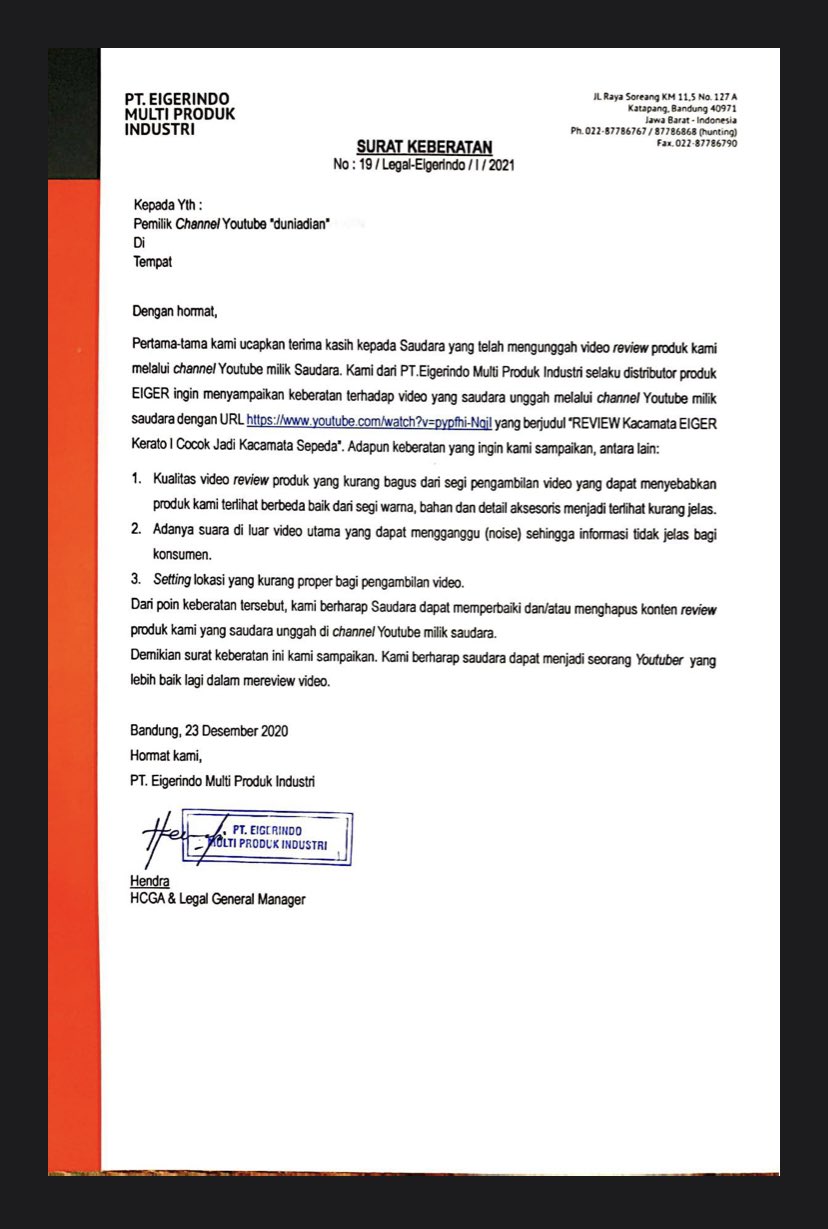Recently, the Indonesian Twitter feed was shaken by a user (@duniadian) uploading a complaint letter he got from a local brand called Eiger. The post gained 47.5k retweets and 8.1k replies

Eiger itself is a renowned local brand, focusing on outdoor gear. This company produces products for mountain climbing, camping, and rock climbing activities such as bags and jackets.
Founded by Ronny Lukito in the 1990s, the first Eiger store opened in 1994 in Cihampelas, Bandung. Now, it has approximately 155 stores located in Indonesia.

The Twitter user @duniadian owned a YouTube channel where he put his review of his Eiger gear.

And the complaint letter from Eiger was about the video of @duniadian reviewing a pair of Eiger sunglasses.
The main points of the complaint from Eiger were:
- A “not-good-enough” video quality that made the product looks different in terms of colour and details
- The noise in the background
- Improper location where the video was taken.
And thus, the Eiger “wished” him to fix and/or delete the content of the review – which eventually Eiger’s reckless action was condemned by the public.
For those who can read the Indonesian language, the full complaint letter from Eiger is like this.
It was not a sponsored video and the tone of the video was not negative. Instead of sending such a complaint letter, the company could have used many ways to turn this review into a free endorsement opportunity.
Insead, the letter ignited a rage, with many Eiger ‘fans’ swearing not to buy the brand’s products anymore.
As this topic was trending up, other companies jumped in to try to ride the wave. Eiger’s direct competitor, Arei, published on Instagram a letter called “Surat Keringanan” (relief letter) — literally an opposite to Eiger’s “Surat Keberatan” (complaint letter).
The letter tells people that they have every right to review the Arei products using any cameras, any themes, and in any location as much as they like:
Many more are jumping the “love letter” bandwagon. Here are 4 examples amongst many of them.
While these brands were getting compliments for being creative and making use of the timing (and these brands are gaining public attention as well), an unfortunate event happened to First Media, an internet service provider in Indonesia.
Unlike the other brands which got positive feedback from the public, the letter from First Media ignited the cynical response. So what went wrong?
This is what they posted:
The notice translation is below:
The main reason is because of the reputation of First Media itself.
If you go to Twitter and check the search bar, they are getting complaints about their bad connection 24/7.
And when they sent out “love letters” for their customers to publicly “criticize” them, it was perceived as funny. The customers have been complaining and giving actual reviews everyday, to deaf ears – their service has not improved.
After getting so much “negative feedback”, they took down the post from their Instagram.
Newsjacking has been proven as an effective marketing practice. What we can learn from this Eiger-newsjacking is that brands can’t Newsjack every story.
And in order to do it effectively, brands should know themselves well enough to know what works and what doesn’t, and don’t force it.
Clearly, First Media was not aware of what works for them before the incident. But now, they have known enough that in their position, Newsjacking doesn’t work.














